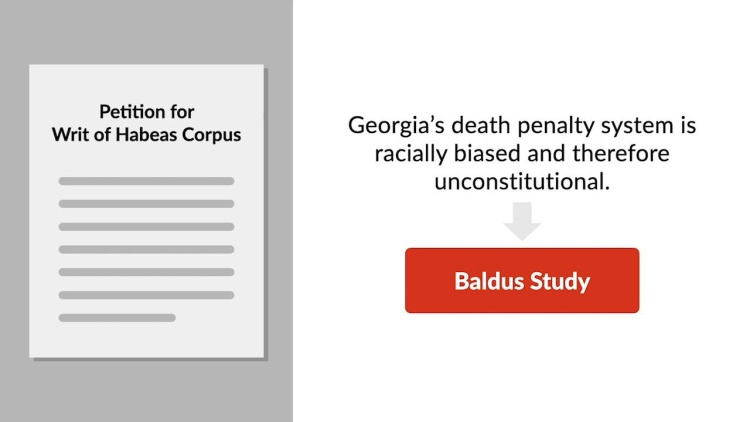McCleskey v. Kemp
United States Supreme Court
481 U.S. 279, 107 S. Ct. 1756, 95 L. Ed. 2d 262 (1987)
- Written by Megan Petersen, JD
Facts
McCleskey (defendant), an African American man, was convicted of two counts of armed robbery and one count of murdering a Caucasian police officer in Atlanta, Georgia. At trial, the jury recommended that McCleskey be sentenced to death on the murder charge and two consecutive life sentences on the armed-robbery charges. The court followed this recommendation and sentenced McCleskey to death. McCleskey filed a petition for a writ of habeas corpus in federal district court, alleging that Georgia’s capital-sentencing process was administered in a racially discriminatory manner in violation of the Eighth and Fourteenth Amendments to the United States Constitution. To support his claim, McCleskey offered a statistical study that purported to prove a disparity in the imposition of death sentences in Georgia based on the race of the murder victim and the race of the defendant. For example, the study concluded that in instances where a White victim was killed by an African American defendant, the defendant was 22 times more likely to be sentenced to death than if the victim was also African American. The study also suggested that prosecutors were significantly more likely to seek the death penalty for African American defendants than for White defendants. The district court denied McCleskey’s claim based on the study, and the court of appeals affirmed. The United States Supreme Court granted certiorari.
Rule of Law
Issue
Holding and Reasoning (Powell, J.)
Dissent (Brennan, J.)
Dissent (Blackmun, J.)
What to do next…
Here's why 907,000 law students have relied on our case briefs:
- Written by law professors and practitioners, not other law students. 47,100 briefs, keyed to 996 casebooks. Top-notch customer support.
- The right amount of information, includes the facts, issues, rule of law, holding and reasoning, and any concurrences and dissents.
- Access in your classes, works on your mobile and tablet. Massive library of related video lessons and high quality multiple-choice questions.
- Easy to use, uniform format for every case brief. Written in plain English, not in legalese. Our briefs summarize and simplify; they don’t just repeat the court’s language.





